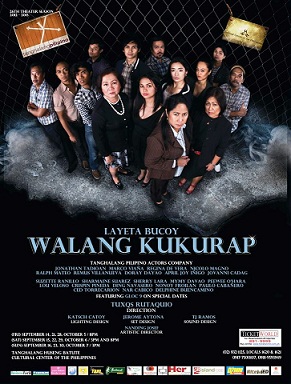By PABLO A. TARIMAN
 THERE is much to appreciate in the 26th theater season of Tanghalang Pilipino.
THERE is much to appreciate in the 26th theater season of Tanghalang Pilipino.
Its production of “Walang Kukurap” written by Layeta Bucoy can pass for a contemporary version of Thornton Wilder’s “Our Town.”
Here you see small-town politicians and their supporters trying to wrest control over the town’s sources of lucrative revenues. There is nothing in this play that we have not observed in the country’s social and political scene; the play mere echoes what’s going on and proceeds why this is so. In the process, the play tells us the shocking realities behind façade of our so-called polite society.
Christina (Suzette Ranillo) runs for mayor to support her children’s schooling and to take care of his ailing father (Crispin Pineda). But she has to deal with the usual sources of election funds like the Chinese businessman Lu (Jonathan Tadioan) and of course, she has to find a way to beat her political opponents played by Nonoy Froilan, Sherry Lara, and Mymy Davao, among others.
The siblings of these candidates get into the fray and here you see them use love, lust, murder, sense of gratitude, everything in the persuasion arsenal to realize their wicked political agenda. Even the mother (Peewee O’Hara) of a son accidentally killed in a bar fray uses the son’s tragic endings to raise more funds even as she doubles as tricycle driver and willing sidekick to another politician.
The role of Sherry Lara as Purita has chilling repercussion as she avails of a gun for hire (Lou Veloso) to get rid of her own husband so she can take over as the ultimate candidate. In her own words, no widow of a candidate ever loses elections because of public sympathy. But as she is transformed from itinerant gambler to a potential candidate espousing the virtues of a school named Purity of the Soul and projecting her religious virtues by dressing up the town’s patron saint, you see that many candidates in this country uses religious smokescreen to hide the inherent evil within.
In the end, it’s a lost cause for the clean but losing candidate Doray played by Doray Dayao.
The play jolts the audience as they get to know the labyrinth of lies and deceptions in small-town politics. But apart from exposing the evils of political corruptions inherent even in the countryside, the play doesn’t offer a catharsis on which one can hang on to for a glimmer of hope and redemption. As it is, the play sends us a chilling message that everything in this country is hopeless and for us to be wary of politicians.
The playwright, in her notes, says the play is an invitation to two possible types of roads to take. “The first one is a journey towards a solution. The second one is a journey towards understanding the very road itself. The first journey leads the hiker to a specific treasure. The second journey wants to force the hiker to decide on what to do with the road.”
By her own reckoning, the playwright hopes “Walang Kukurap” can offer a map and leave the audience to find their own directions.
Indeed, there is no question that the play is an indictment of the country’s political system. It deplores the lucrative economic pay-offs of political dynasties and why jueteng will remain the masa’s game for all seasons.
But somewhere in the play, you long for a closure, a catharsis as to where these shocking events are all leading us.
 But in the end, you settle with other elements of the play you can enjoy like the delight of seeing good actors. The scene of Pineda with Ramillo was the most poignant moment of the play and so was the superb chameleon-like transformation of Sherry Lara whose character reflected everything that was wrong with a learning institution called Purity of the Soul. The play has an equally superb acting ensemble from the lead cast to the supporting actors namely Tadioan (as Lu), Peewe O’Hara (as Panchang), Delphine Buencamino (as Mirra), Regina de Vera (as Rhoda), Nonoy Froilan (as Santiago, Sr.), Davao (as Melba), Lou Veloso(as Paquito), Dayao (as Doray) and Ced Torrecarion (as Elex), among others.
But in the end, you settle with other elements of the play you can enjoy like the delight of seeing good actors. The scene of Pineda with Ramillo was the most poignant moment of the play and so was the superb chameleon-like transformation of Sherry Lara whose character reflected everything that was wrong with a learning institution called Purity of the Soul. The play has an equally superb acting ensemble from the lead cast to the supporting actors namely Tadioan (as Lu), Peewe O’Hara (as Panchang), Delphine Buencamino (as Mirra), Regina de Vera (as Rhoda), Nonoy Froilan (as Santiago, Sr.), Davao (as Melba), Lou Veloso(as Paquito), Dayao (as Doray) and Ced Torrecarion (as Elex), among others.
The lighting design of Katsch Catoy illumined the play’s smoldering revelations and jibing perfectly with TJ Ramos’s superb sound design.
Director Tuxqs Ruttaquio found an intelligent way to make the playwright’s intentions come to life.
But as expressed earlier, the play succeeding in unmasking what is wrong with the country’s political system but didn’t share with her audience something they can go home with and that is hope for the future.
And for this, Tanghalang Pilipino should be credited for honing both promising actors and aspiring playwrights. For as someone wiser said earlier, the play is the beginning of knowledge.